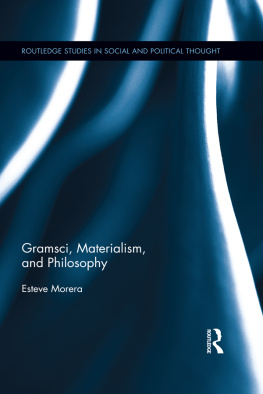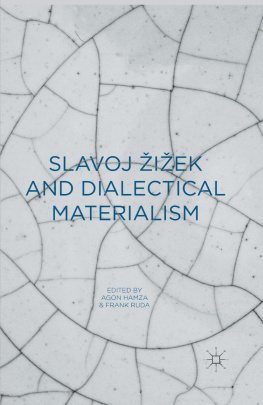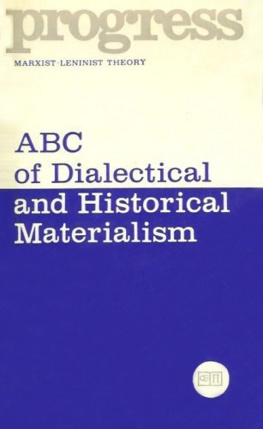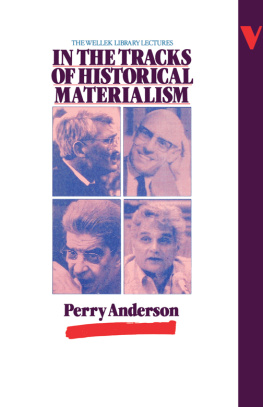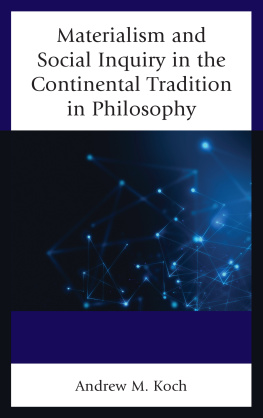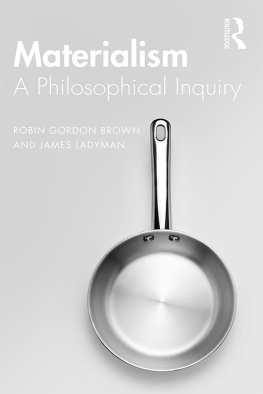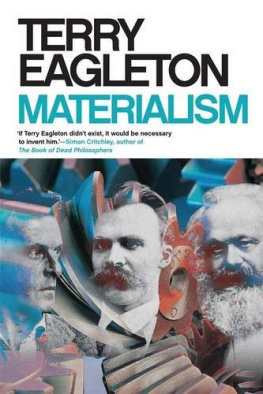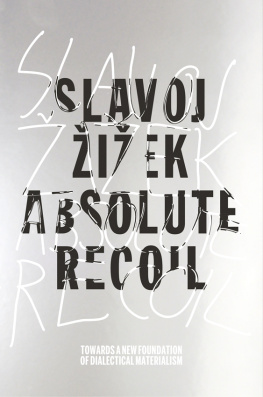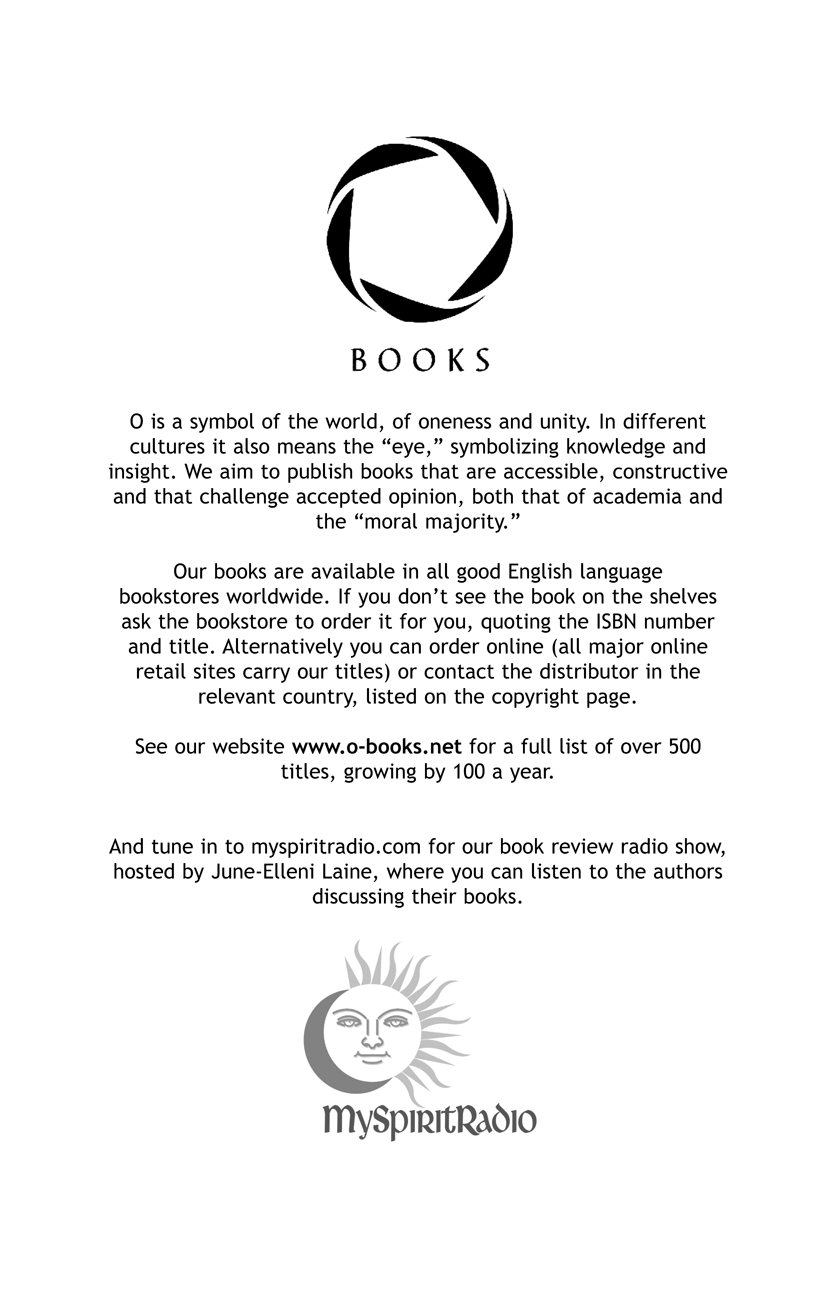Acknowledgments
I would like to thank Herminio Martins who greatly encouraged me in writing this book. Thanks are also due to my supervisors at the University of Reading during the period I was taking my MA in Philosophy. Although they frequently disagreed with me profoundly, their discussion of my essays and dissertation helped to sharpen and improve the ideas expressed here. I also appreciate the editorial and production staff at O-Books for their skills and support of new authors and unorthodox ideas.
I would especially like to express my gratitude to Simon Weston OBE and his agents for their permission to quote from his book Walking Tall in my Chapter 9, Pain and Suffering.
1
Material World
Love comes in silence,
But you know when it has arrived,
Thereafter you will never be alone,
And never have sadness within you.
Wedding card greeting, translated from Spanish
Why have I been sitting here at this computer keyboard, staring at the screen for the past hour, not knowing how to begin? Im doing this, in part, because I want to be a writer. I want to become someone who shares my thoughts and feelings with others. Hhhhhhhhhhhh
I got stuck, and, waiting for inspiration to strike, I accidentally pressed the h key, and my computer software helpfully capitalized the initial h.
Another 20 minutes have passed. Never mind. Let me tell you a little about myself. For 21 years I was married to Ana Mara. On the first of January 2003, four months ago as I write these words, she died after a long illness, and now her ashes lie in Wolvercote cemetery. Over the past several years, I have been trying to work out some meaning to my life, and it isnt easy. The harder I look, the harder it gets. This is especially so because Im trying to be true both to:
- My personal experience as a human being
- Humankinds current scientific understanding.
My experience of the universe is that it is astonishingly and overwhelmingly beautiful. In 1995, Ana Mara and I, both of us secular, were invited to our first Quaker meeting by two gay friends of ours, Steve and Jon, who were getting married. It was a wonderful service, but I want to tell you about the meeting we attended two weeks later. Quaker meetings are based on silent worship, and I spent an hour, sitting in silence, looking at the vase of flowers resting on the central table.
Shortly before this, I had just finished reading Consciousness Explained, by Daniel Dennett (1991). His thesis is that consciousness, when understood as comprising qualitative, personal human experiences, does not exist. The word consciousness does have a meaning, Dennett says, but this is no more than a description of certain behavioral abilities that human beings have, such as the ability to talk about objects: What a cute blue vase! If, however, we actually believe that there is such a thing as an experience of blue, which corresponds to this utterance, then we are deluded. He mocks such a belief as nonsensical, likening it to a belief in figment in the brain, corresponding to pigment on the surface of the vase, (see his Chapter 12).
Sitting in the meeting, something happened that profoundly influenced me. The little voice in my head the me that chatted, commented upon, analyzed and evaluated everything that I saw during the course of my waking life stopped. For the first time in at least forty years I simply experienced the visual world. The peace and beauty of the room, the people, and the garden I could see through the window, all overwhelmed me with the force of a tidal wave
Wow! That was
And, with the beginning of that thought, the purity of this experience was at an end. Nonetheless, I was permanently changed. No longer could I think of the voice in my head as being me. It was merely a portion of me, and my experiences were an equally important part of who I was as a person, and they did not need the validation of my internal commentary to establish their existence. Dennett, I was convinced, must be wrong.
Nonetheless I was utterly baffled because I did not have the least scintilla of an idea as to how consciousness might possibly be explained. From that time on, I developed an intense interest in the philosophy of consciousness, with a particular concern to understand how it must somehow fit into the natural, scientific order of the world. During the 1990s, there was an explosion of books on the subject. The anthology The Nature of ConsciousnessPhilosophical Debates, edited by Ned Block, Owen Flanagan and Gven Gzeldere (1997) was extremely useful. It contains a selection of seminal academic papers, such as What Mary didnt know, by Frank Jackson, and What is it like to be a bat? by Thomas Nagel, together with responses from their critics. Such collections are the best way to get into the topic because they provide a variety of opposing viewpoints. Most unusually, academic papers in this field are accessible to anyone who is prepared to study. Moreover, this particular collection was enhanced by having a thorough introductory overview by Gven Gzeldere.
By the summer of 2002, we both knew that Ana Mara was dying. We had to constrain our activities in accordance with her limitations, and I had to plan for my future without her. One activity we could still share was cooking, and this gave us great pleasure right to the end. That December, for example, we managed to have a traditional Christmas dinner with all the trimmings. Ana Mara contributed as much as she was able by peeling the vegetables. She wanted to do more, but I wouldnt let her get up from the table, because I was afraid that she would collapse.
As for myself, I was developing my thinking about consciousness, and fortunately I could do most of this work without leaving the house. In September 2002, I submitted an abstract for a short talk at the Quantum Mind 2003 symposium, hosted by the University of Tucson, Arizona. To the delight of both of us, this was accepted. It meant, however, that I had to make some difficult choices. Much of my spare time I would spend keeping Ana Mara company, but I also spent a lot of my time alone in my room, working on my presentation. In March, after Ana Maras funeral, I went to the symposium, and gave my talk. The friendly people there approached consciousness from an astonishing variety of viewpoints, and every day was crammed with inspiring and sometimes difficult lectures. The second leg of my trip was to Florida, to visit our niece and nephew, Rosana and Luis.
Personhood, folk psychology, and libertarian free will
This book has its roots in my thinking during this testing time, but, of course, this is no reason for you to accept my ideas. On the contrary, it is more reasonable to accept ideas that have been examined with a certain degree of dispassion. My reason for telling you this history is that such events are universal. In extremis, we are each forced to examine the bottom line of our existence, and to give such shape and meaning to our lives as we can.
One of the most profound aspects of our strange and beautiful cosmos is that we can experience it, and share these experiences with others. Also at least so it appears we can make free choices based on these experiences, and these choices do affect the course of events. Most of these choices are trivial, such as choosing between tea and coffee. Some, however, such as my decision to give the talk at the convention, have the effect of defining who we are as persons, and are our attempts to give structure to the whole future course of our lives. Moreover, such decisions involve us in moral compromises. Trying to advance human understanding is a moral good (even if I fail completely), but it also involved at least sometimes choosing to spend time away from my dying wife.


